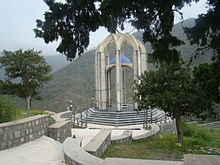Abulgasim Nabati
From Wikipedia, the free encyclopedia
Seyid Abulgasim Nabati (Persian: سید ابوالقاسم نباتی, Azerbaijani: Əbülqasım Nəbati, 1812–1873) was a 19th-century Iranian Azerbaijani poet.
You can help expand this article with text translated from the corresponding article in South Azerbaijani. (January 2023) Click [show] for important translation instructions.
|
Very little information of his life is known that is not even accurate as to the people to whom he belonged. It is only known that Nabati graduated from high school, spent his youth in Arasbaran, later visited the tomb of Sheikh Shahabaddin in Ahar, after which he returned to his native Ushtibin, where he lived until his death. After his death, his poems, not all of which were published during his lifetime, or even recorded, were performed by locals as the song.
He wrote in Azerbaijani and Persian. His first poem was published in Tabriz in 1845. Nabati poem written in Azerbaijani as quantitative metric ( araz ) and syllabic People, among his heritage present as Ruban, and gazal, dedicated to the chanting of the beauties of nature, human love, appeals to enjoy the pleasures of life. Nabati also wrote poetry and philosophy, in which the important topic was pantheism, although this part of his legacy is controversial : some of his works can be seen or Sufi mystic, some - even atheistic sentiments. In the poetic heritage Nabati had the influence of classical models as Eastern poetry, and folk art. The form of his poetry had some influence on the development of ashug verse.
Notes
Wikiwand - on
Seamless Wikipedia browsing. On steroids.

